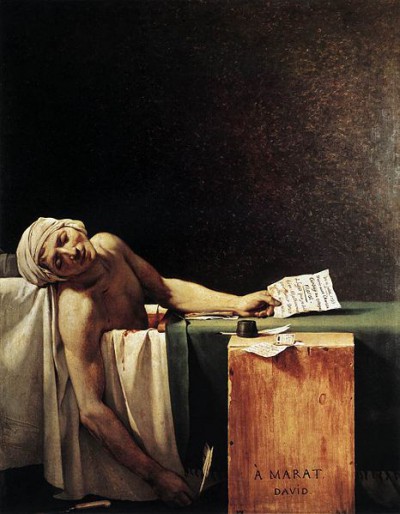Sunday January 12. 2014, Movie night, The Persecution and Assassination of Jean-Paul Marat as Performed by the Inmates of the Asylum of Charenton Under the Direction of the Marquis de Sade, Door opens at 20:00, film begins at 21:00
Director: Peter Brook. Writers: Peter Weiss (play), Geoffrey Skelton (English translation). Stars: Patrick Magee, Clifford Rose, Glenda Jackson. The film is in English language. Duration: 116 min.
Set in the historical Charenton Asylum, Marat/Sade is almost entirely a “play within a play”. The main story takes place on July 13, 1808, after the French Revolution; the play directed by Marquis de Sade within the story takes place during the Revolution, in the middle of 1793, culminating in the assassination of Jean-Paul Marat (which took place on July 13, 1793), then quickly brings the audience up to date (1808). The actors are the inmates of the asylum, and the nurses and supervisors occasionally step in to restore order. The bourgeois director of the hospital, Coulmier, supervises the performance, accompanied by his wife and daughter. He is a supporter of the post-revolutionary government led by Napoleon, in place at the time of the production, and believes the play he has organised to be an endorsement of his patriotic views. His patients, however, have other ideas, and they make a habit of speaking lines he had attempted to suppress, or deviating entirely into personal opinion. Suffice it to say that they, as people who came out of the revolution no better than they went in, are not entirely pleased with the course of events as they fell.
The Marquis de Sade, the man after whom sadism is named, did indeed direct performances in Charenton with other inmates there, encouraged by Coulmier. De Sade is a main character in the play, conducting many philosophical dialogues with Marat and observing the proceedings with sardonic amusement. He remains detached and cares little for practical politics and the inmates’ talk of right and justice; he simply stands by as an observer and an advocate of his own nihilistic and individualist beliefs. One of the most powerful scenes of the play depicts him being whipped on his own instructions, and such bold scenes are not alone, nor confined to the predilections of the Marquis himself.
Marat/Sade is a play with music. This follows much in the path of Bertolt Brecht where the songs comment on themes and issues of the play. Unlike a traditional musical format, the songs do not further the plot or expositional development of character in the play. In contrast, they often add an alienation effect, interrupting the action of the play and offering historical, social and political commentary. Richard Peaslee composed music for the original English-language production of Marat/Sade directed by Peter Brook.
Film night at Joe’s Garage, warm and cozy cinema! Doors open at 8pm, film begins at 9pm, free entrance. You want to play a movie, let us know: joe [at] squat [dot] net



